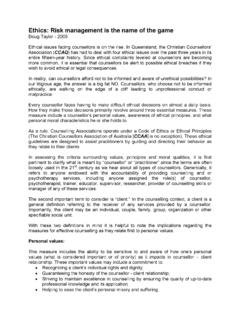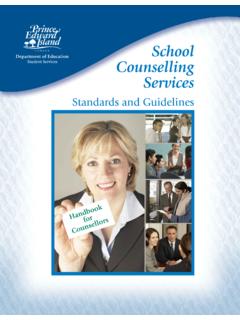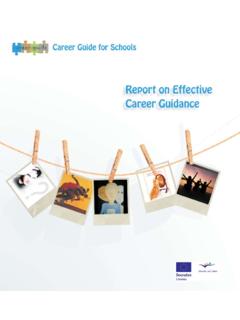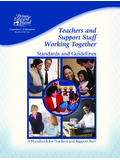Transcription of Ethics - Christian Counsellors Association of Australia
1 Ethics , morality, law and best practice touch every part of our life. The aim of this paper is to reflect on significant ethical issues as they relate to professional counselling and psychotherapy. Reference will be made to the ethical guidelines of the Christian Counsellors Association of Australia (CCAA), the Psychotherapy and Counselling Federation of Australia (PACFA), as well as other professional opinion. Consideration will be given to: professional orientation ; ethical obligations underpinning counselling practice; professionalism and best practice in counselling and psychotherapy; boundaries and boundary violations; dual relationships; confidentiality; use of prayer and spiritual practices; understanding social and cultural implications of the counselling role; maintenance of records; the role of ongoing professional development; regular participation in Supervision; a health check of your ethical process.
2 PROFESSIONAL ORIENTATION The starting point of good ethical practice is the necessity to be appropriately trained through an accredited training organisation, together with a clear understanding of the professional functioning of the roles and functions of counselling. It is also essential to develop an understanding of the history and philosophy of the profession and become familiar with appropriate professional organisations like CCAA and PACFA. Knowing the process of professional credentialing provides the ability to work within the frameworks of ethical standards and the Codes of Ethics of such organisations (Remley & Herlihy, 2005, p67) . The intentional development of an ongoing professional orientation, and the participation in professional development within the context of our Ethics Relationships and PracticeBy Phil Henry61 Counselling Connections Across Australiaprofession, provides the ability to mature ethically in developing awareness, knowledge and skill (Corey, 1996, p79).
3 ETHICAL OBLIGATIONS UNDERPINNING COUNSELLING PRACTICEB rock and Barnard (2009) confirm that the unforeseen is always a threat, and that risk can be minimised by adhering to the common practice guidelines specified in Ethics codes that make up the accumulated wisdom of the profession (p178). As professional Counsellors , it is our responsibility to be fully aware of, and work within, the Codes of Ethics upon which our professional memberships are based. Codes of Ethics are formed for our safety and the safety of our AND BEST PRACTICE IN COUNSELLING AND PSYCHOTHERAPYBest practice is a continuum of law and Ethics which guides us as we relate to others. However, Ethics as it relates to professional process refers to the conduct judged as good or right for Counsellors as a professional group.
4 Likewise, professionalism has to do with the relationship between legal and ethical behaviour. Best practice is the very best a Counsellor could be expected to do. Meeting minimum legal standards or minimum ethical standards is not enough for a truly professional AND BOUNDARY VIOLATIONSM aintaining professional boundaries is integral to ethical and professional counselling practice. The relationship between client and therapist is built on trust, confidentiality and the appropriate balance of power. Clients must feel safe and believe that their interests are paramount within the professional relationship (Morrissey & Reddy, 2006, p89). From the initial contact, the therapist sets the frame and boundaries of therapy.
5 Setting the ground rules and providing the necessary information about the process is vital. Important issues include informed consent, style of therapy, the welfare of clients, fee for service and payment of fees, confidentiality issues, frequency and length of session. These all play a part in setting the correct boundaries for a professional therapeutic of boundaries can occur when they are least expected. Issues which relate to sexual attraction (therapist to client and vice-versa), dual relationships, physical touch, meeting outside of the therapeutic environment, the inappropriate use of Christian processes within the context of professional therapy, the imposition of personal values onto the client and self disclosure can spiral into malpractice complaints.
6 DUAL RELATIONSHIPSNon-sexual dual relationships in therapy refer to any situation where multiple roles exist between the therapist and the client. Examples of dual relationships are when a client is also a student, friend, family member, employee or a business associate of the therapist (Zur 2009, p355). Counsellors must avoid dual relationships that could impair their professional judgement or increase the risk of client exploitation ( CCAA Code of Ethics ). Sexual dual relationships are a breach of the CCAA Code of Ethics (see Code ) The Code states that a counsellor is prohibited from carrying on sexual activities, inappropriate attachment or cohabitating with a current client under any circumstances.
7 Rothschild states: For therapist self-care, dual awareness being able to take into account information from all systems will contribute to decreased professional risks for compassion fatigue, vicarious trauma, and burnout, not to mention overall safety (2006, p178).CONFIDENTIALITYC onfidentiality is central to developing a respectful, trusting therapeutic relationship, and as such, as therapists, we have the duty to discuss all aspects of confidentiality with our clients. This discussion also includes limitations of confidentiality. The CCAA Code of Ethics states: The exception to maintaining confidentiality is a client threatening to harm self or another through suicide, homicide, or serious and imminent abuse.
8 It is the duty of Counsellors to disclose such information to their Supervisors and to the authorities including, where relevant, the Police and relevant Child Protection Authority in their jurisdiction (see Code ).USE OF PRAYER AND SPIRITUAL PRACTICES As Christian Counsellors it is important that the following statement in the CCAA Code of Ethics is noted and understood. Code states that CCAA Members: will recognise that counselling is a different process to Prayer Ministry or Prayer Counselling and that all types of Prayer Ministry including Theophostic, Word of Knowledge, Spiritual Discernment, Prophecy and other similar practices are not counselling per se; they are practices of the Christian Church. Those engaged in such Prayer Ministries who are untrained Counsellors are not covered 62 Counselling Connections Across Australiaby this Code of Ethics .
9 There is a distinction between people who engage in Prayer Ministries and those who engage in Counselling . UNDERSTANDING SOCIAL AND CULTURAL IMPLICATIONS OF THE COUNSELLING ROLEWe live in a culturally diverse and pluralistic society. As such, it is important that therapists accept the need to grow in multi-cultural and broad social competence. As we work with clients who may be different from ourselves, the cultural norms of world view, social class, gender, age, sexual orientation, disability status, place of residence, marital status, language and religion may present complexities within the therapeutic relationship. As therapists, a growing self awareness in the areas of available resources, aspects of traditional approaches, perceptions and misperceptions of other cultures, institutional barriers, language and labelling are important considerations.
10 Expansion of all areas related to our culture, and that of our clients, is invaluable to our growth as OF RECORDSC omplaints happen. Over the course of our professional life there is reasonable likelihood that we will all face complaints related to our professional practice. (CCAA has in place a Complaints Procedure listed on the CCAA Website- ). To be able to respond effectively to a complaint, it is important that client record keeping is maintained. Being subject to a complaint is confronting, distressing and discouraging. It brings into question one s self-image as a professional and as an honourable and competent practitioner (Morrissey & Reddy 2006, p150). Maintenance of factual detailed session notes is critical when legal issues arise or subpoenas are received.











